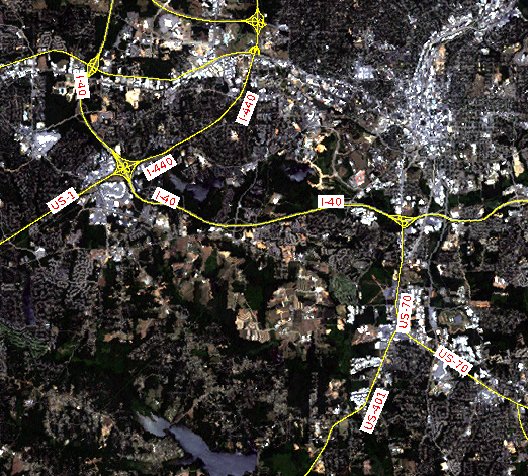
Note: A new GRASS GIS stable version has been released: GRASS GIS 7. Go directly to the new manual page here
NAME
v.label.sa - Create optimally placed labels for vector map(s)
KEYWORDS
vector, paint labels
SYNOPSIS
v.label.sa
v.label.sa help
v.label.sa map=name [type=string[,string,...]] [layer=integer] column=name labels=name font=string [size=float] [isize=float] [charset=string] [color=string] [hcolor=string] [hwidth=float] [background=string] [opaque=yes|no] [border=string] [width=float] [overlap=name] [--verbose] [--quiet]
Parameters:
- map=name
- Name of input vector map
- type=string[,string,...]
- Feature type
- Options: point,line,area
- Default: point,line,area
- layer=integer
- Layer number
- A single vector map can be connected to multiple database tables. This number determines which table to use.
- Default: 1
- column=name
- Name of attribute column to be used for labels
- labels=name
- Name for new paint-label file
- font=string
- Name of TrueType font (as listed in the fontcap)
- size=float
- Label size (in map-units)
- Default: 100
- isize=float
- Icon size of point features (in map-units)
- Default: 10
- charset=string
- Character encoding (default: UTF-8)
- Default: UTF-8
- color=string
- Text color
- Options: aqua,black,blue,brown,cyan,gray,green,grey,indigo,magenta,orange,purple,red,violet,white,yellow
- Default: black
- hcolor=string
- Highlight color for text
- Options: none,aqua,black,blue,brown,cyan,gray,green,grey,indigo,magenta,orange,purple,red,violet,white,yellow
- Default: none
- hwidth=float
- Width of highlight coloring
- Default: 0
- background=string
- Background color
- Options: none,aqua,black,blue,brown,cyan,gray,green,grey,indigo,magenta,orange,purple,red,violet,white,yellow
- Default: none
- opaque=yes|no
- Opaque to vector (only relevant if background color is selected)
- Options: yes,no
- Default: yes
- border=string
- Border color
- Options: none,aqua,black,blue,brown,cyan,gray,green,grey,indigo,magenta,orange,purple,red,violet,white,yellow
- Default: none
- width=float
- Border width (only for ps.map output)
- Default: 0
- overlap=name
- Numeric column to give precedence in case of overlapping labels. The label with a smaller weight is hidden.
- Default:
DESCRIPTION
v.label.sa makes a label-file from a GRASS vector map
with labels created from attributes in the attached table. The labels are
placed in as optimal place as possible. The label file has the same syntax
as the one created by v.label
EXAMPLE
North Carolina example:
# get font names:
d.font -L
v.label.sa roadsmajor labels=roads_labels column=ROAD_NAME color=red \
background=white size=250 font=Vera
# set region:
g.region rast=lsat7_2002_10 -p
# display:
d.rgb b=lsat7_2002_10 g=lsat7_2002_20 r=lsat7_2002_30
d.vect roadsmajor col=yellow
d.labels roads_labels

Road labeling with v.label.sa (Raleigh, North Carolina, USA, area)
REFERENCES
Edmondson, Christensen, Marks and Shieber: A General Cartographic
Labeling Algorithm, Cartographica, Vol. 33, No. 4, Winter 1996, pp. 13-23
The algorithm works by the principle of Simulated Annealing.
SEE ALSO
d.label
d.labels
ps.map
Wikipedia article on simulated annealing
AUTHOR
Wolf Bergenheim
Last changed: $Date: 2011-11-08 01:42:51 -0800 (Tue, 08 Nov 2011) $
Main index - vector index - Full index
© 2003-2016 GRASS Development Team


